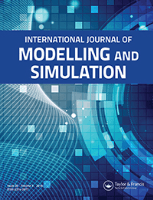
INTERNATIONAL JOURNAL OF MODELLING AND SIMULATION
Scope & Guideline
Pioneering Insights in Engineering and Data Analysis
Introduction
Aims and Scopes
- Mathematical Modelling:
The journal emphasizes the formulation and analysis of mathematical models to describe complex phenomena in fields such as fluid dynamics, thermal processes, and biological systems. - Simulation Techniques:
A core area of the journal is the advancement and application of simulation techniques, including numerical methods, computational fluid dynamics, and machine learning algorithms, to solve real-world problems. - Interdisciplinary Research:
The journal encourages interdisciplinary research that combines concepts from physics, engineering, biology, and environmental science, facilitating innovative solutions and insights. - Nanofluid Dynamics:
A significant focus is placed on the study of nanofluids, including their thermal and flow characteristics, which are critical for applications in heat transfer and energy systems. - Renewable Energy Systems:
Research related to the modeling and simulation of renewable energy systems, such as solar and wind energy, is prominently featured, reflecting the journal's commitment to sustainability. - Control Systems:
The journal also explores control systems, particularly in the context of power systems and automation, highlighting the importance of robust control methodologies.
Trending and Emerging
- Machine Learning Applications:
There is a growing trend in the application of machine learning techniques to enhance modeling and simulation processes, particularly in predictive analytics and optimization across various domains. - Bioconvection and Biological Systems:
Research on bioconvection and the dynamics of biological systems, particularly involving nanofluids and microbial interactions, is increasingly prominent, showcasing the journal's commitment to addressing ecological and health-related issues. - Thermal Management in Nanofluids:
An emerging focus on thermal management and heat transfer efficiency in nanofluids signifies a shift towards improving energy systems and materials science. - Renewable Energy Integration:
The integration of renewable energy sources into existing systems, particularly through advanced modeling and simulation techniques, is gaining traction as global energy demands shift. - Fractional Calculus in Modeling:
The use of fractional calculus in modeling complex systems is on the rise, reflecting an interest in capturing memory and hereditary properties in various physical phenomena.
Declining or Waning
- Traditional Fluid Dynamics:
Research focused solely on classical fluid dynamics without incorporating modern computational techniques or interdisciplinary approaches is becoming less frequent, as the field evolves towards more complex, multi-physics interactions. - Basic Statistical Methods:
Papers relying heavily on traditional statistical methods without integration with advanced computational or machine learning techniques are waning, as researchers increasingly seek innovative analytical frameworks. - Single-Domain Studies:
There is a noticeable decline in studies that focus exclusively on a single domain, such as purely mechanical or electrical systems, as interdisciplinary approaches that integrate multiple domains are gaining favor.
Similar Journals
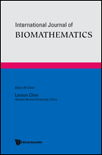
International Journal of Biomathematics
Advancing Quantitative Insights in Biological SystemsInternational Journal of Biomathematics is a premier scholarly publication dedicated to the intersection of mathematics and biological sciences. Published by World Scientific Publishing Co Pte Ltd in Singapore, this journal serves as a vital resource for researchers and practitioners seeking to explore the quantitative modeling of biological systems. Recognized for its significant contributions to Applied Mathematics and Modeling and Simulation, it achieved a commendable Q2 ranking in both categories in 2023, reflecting its impact within the academic community. The journal, with ISSN 1793-5245 and E-ISSN 1793-7159, promotes open access to facilitate the dissemination of knowledge and encourages submissions that advance the theoretical and practical applications of biomathematics. With a commitment to fostering interdisciplinary collaboration, the International Journal of Biomathematics plays an essential role in shaping the future of research in mathematical biology.

INTERNATIONAL JOURNAL OF HEAT AND FLUID FLOW
Contributing to Excellence in Mechanical Engineering ResearchFounded in 1979, the INTERNATIONAL JOURNAL OF HEAT AND FLUID FLOW is a premier publication in the fields of mechanical engineering, fluid dynamics, and heat transfer, published by Elsevier Science Inc. With an impressive impact factor and ranking in the Q1 category for Mechanical Engineering and Q2 for Condensed Matter Physics and Fluid Flow and Transfer Processes, this journal is highly regarded for its rigorous peer-reviewed articles that contribute significantly to the advancement of knowledge in these critical areas. Researchers, professionals, and students can access cutting-edge studies that explore the intricacies of thermal and fluid systems, ensuring they stay at the forefront of scientific exploration. The Scopus rankings further affirm its role as a leading source of impactful research, with significant placements in crucial academic categories. Join an active community of scholars committed to innovation and excellence in the exploration of heat and fluid flow phenomena.
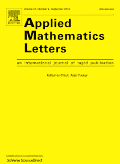
Applied Mathematics Letters
Advancing Knowledge Through Significant Mathematical ResearchApplied Mathematics Letters is a prestigious journal dedicated to the dissemination of significant research in the field of applied mathematics. Published by PERGAMON-ELSEVIER SCIENCE LTD in the United Kingdom, this journal serves as a vital resource for researchers, professionals, and students alike, aiming to bridge theoretical findings and practical applications. With an impressive impact factor placing it in the Q1 category and ranked 33 out of 635 in the Applied Mathematics category by Scopus, it showcases influential articles that contribute to advancements across various applications of mathematics. The journal's coverage from 1988 to 2025 ensures a rich archive of research that remains relevant and insightful for contemporary studies. Currently, it operates under a subscription-based model, providing access to cutting-edge research that forms the backbone of mathematical application in science and engineering. To become part of this dynamic community of scholars, readers are encouraged to explore the latest findings and ongoing discussions that highlight the interplay between mathematics and its real-world impacts.
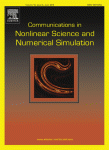
Communications in Nonlinear Science and Numerical Simulation
Empowering Discoveries in Applied Mathematics and SimulationCommunications in Nonlinear Science and Numerical Simulation is a premier journal published by ELSEVIER, dedicated to advancing the field of applied mathematics and numerical analysis. With an impressive Q1 ranking in categories such as Applied Mathematics, Modeling and Simulation, and Numerical Analysis, this journal stands out as a vital resource for researchers and professionals alike. Established in 1996, it consistently features high-quality research contributions, and its current Scopus rankings highlight its influence and relevance in the field, placing it in the 92nd percentile for Applied Mathematics and 91st for Numerical Analysis. The journal not only disseminates pivotal findings but also encourages the exploration of nonlinear phenomena and innovative numerical methods. Scholars engaged in computational methodologies and modeling can benefit from its rigorous peer-reviewed articles, fostering collaboration and knowledge exchange within the academic community. Located in the Netherlands, Communications in Nonlinear Science and Numerical Simulation remains a touchstone for cutting-edge research through effective dissemination of ideas that shape future mathematical landscapes.
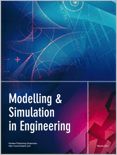
Modelling and Simulation in Engineering
Bridging Theory and Practice in Engineering ExcellenceModelling and Simulation in Engineering is a pioneering open-access journal, published by HINDAWI LTD, and established in 2007. With a focus on advancing the fields of engineering, computer science applications, and modeling and simulation, this esteemed journal serves as a vital platform for researchers, professionals, and students alike. The journal has made significant strides in its academic contributions, reflected in its current categorization within the Q3 quartile in Computer Science Applications, Engineering (miscellaneous), and Modeling and Simulation as of 2023. With a Scopus ranking of 133 out of 307 in General Engineering and 183 out of 324 in Mathematics' Modeling and Simulation, it emphasizes the crucial interplay between theoretical research and practical applications. Each article published in Modelling and Simulation in Engineering undergoes a rigorous peer-review process, ensuring high-quality research dissemination. By maintaining an open-access format, the journal promotes global collaboration and accessibility, supporting the dissemination and advancement of engineering knowledge worldwide. With its headquarters located in the United States, the journal is truly positioned at the convergence of innovation and research.

Eurasian Journal of Mathematical and Computer Applications
Exploring New Horizons in Computational Mathematics and Modeling.Eurasian Journal of Mathematical and Computer Applications, published by the prestigious L N GUMILYOV EURASIAN NATIONAL UNIVERSITY in Kazakhstan, stands as a vital platform for researchers and professionals engaging in the fields of Applied Mathematics, Computational Mathematics, Computer Science Applications, Information Systems, Mathematical Physics, and Modeling and Simulation. With its ISSN 2306-6172 and E-ISSN 2308-9822, this academic journal aims to foster innovative research and facilitate knowledge transfer in these interdisciplinary domains. The journal, which converges its endeavors from 2013 to 2024, is currently ranked Q3 across its various categories in 2023, reflecting its growing influence and commitment to academic excellence. Despite its open access availability, the journal's dedication to quality research is evident as it attracts contributions that not only advance theoretical understanding but also address practical applications. With a supportive community of researchers in an increasingly important field, the Eurasian Journal of Mathematical and Computer Applications is poised to remain a significant resource for those seeking to propel the boundaries of mathematical and computational sciences.
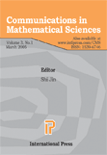
Communications in Mathematical Sciences
Elevating Research Standards in Mathematical SciencesCommunications in Mathematical Sciences is a prestigious journal published by INT PRESS BOSTON, INC, dedicated to advancing the field of mathematical sciences through the dissemination of high-quality research. Since its inception in 2003, the journal has established itself as a key platform for scholars in both applied and theoretical mathematics, evidenced by its impressive rankings, with a Q2 designation in Applied Mathematics and a Q1 status in Miscellaneous Mathematics categories as of 2023. Although not an open-access journal, it provides comprehensive access to groundbreaking studies that span a wide array of topics within mathematical sciences, making it invaluable for researchers, professionals, and students alike. The journal's strong performance metrics, including a Scopus rank that places it in the 64th and 38th percentiles for General and Applied Mathematics, respectively, highlight its influence and significance within the academic community. With an optimistic convergence towards future advancements by 2024, Communications in Mathematical Sciences continues to play a vital role in the growth and evolution of mathematical inquiry.

Top
Innovating Solutions Through Rigorous Academic InquiryTop is a prestigious academic journal published by Springer, dedicated to advancing research in the fields of Discrete Mathematics, Combinatorics, Information Systems and Management, Management Science and Operations Research, Modeling and Simulation, and Statistics and Probability. With its ISSN 1134-5764 and E-ISSN 1863-8279, this journal holds a commendable Q2 ranking across multiple categories as of 2023, evidencing its strong impact within the academic community. The journal has experienced a significant convergence of knowledge from the years 1993 to 1996, 2003, and is active until 2024, showcasing its long-standing commitment to scholarly excellence. Although it does not currently offer Open Access options, its quality is reflected in Scopus rankings, notably being in the 97th percentile for Discrete Mathematics and Combinatorics. Researchers, professionals, and students in these domains are encouraged to engage with Top as it continues to facilitate groundbreaking insights and foster collaboration among various disciplines.

Advanced Theory and Simulations
Elevating Academic Discourse in Statistics and Probability.Advanced Theory and Simulations, published by WILEY-V C H VERLAG GMBH in Germany, stands at the forefront of interdisciplinary research in the realms of modeling, simulation, numerical analysis, and statistics. With a commendable impact factor reflected through its esteemed rankings—Q2 in Modeling and Simulation, Q1 in Multidisciplinary, Q2 in Numerical Analysis, and Q2 in Statistics and Probability—this journal is essential for academia and industry professionals alike who aim to deepen their knowledge and innovate within these dynamic fields. The journal has achieved notable Scopus rankings, with a 91st percentile in Mathematics: Statistics and Probability, emphasizing its critical role in advancing scholarly communication. Since its inception in 2018, Advanced Theory and Simulations has provided an open platform for researchers to share their findings and foster collaborative developments. Although it currently does not operate an open access model, the journal's commitment to rigorous peer review and quality ensures that published work remains highly reputable and impactful. This makes it a vital source of contemporary research for those engaged in theoretical and applied sciences, encompassing a broad range of applications and methodologies.

International Journal of Multiphysics
Advancing Engineering Through Multiphysical InsightsWelcome to the International Journal of Multiphysics, a pioneering platform dedicated to the expansive field of multiphysics and its applications across various engineering disciplines. Published by MULTI-SCIENCE PUBL CO LTD since 2007, this Open Access journal plays a crucial role in disseminating innovative research findings that advance our understanding of complex interactions in multiphysical phenomena. With its ISSN 1750-9548, the journal has made significant contributions within its converged years from 2010 to 2024, offering insights into Computational Mechanics, Fluid Flow, Mechanical Materials, and Numerical Analysis with a current classification in the Q4 Quartile across multiple relevant categories. Researchers, professionals, and students will find valuable information and cutting-edge studies by accessing the journal from the United Kingdom, and thus contribute to ongoing dialogues in these critical areas of study. The International Journal of Multiphysics represents an essential resource for those aiming to innovate and enhance our knowledge of interactive systems in engineering and applied sciences.